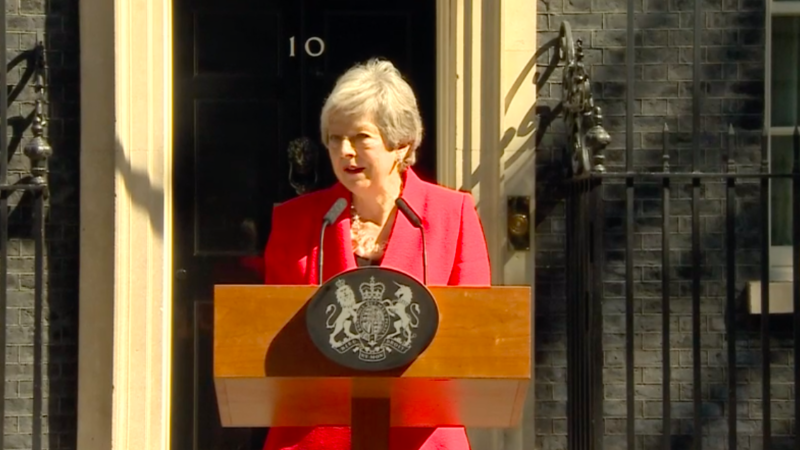
Theresa May announced this morning that she would be stepping down as Tory leader on June 7th. She will later leave Downing Street once her successor has been chosen, at some point towards the end of July. In revealing the news, May gave a speech summing up everything she felt she had achieved in office. Some of these apparent victories may surprise you.
Just as she does every week at Prime Minister’s Questions, May celebrated levels of employment: “We have helped more people than ever enjoy the security of a job.” And as always, she forgot to mention the reality of in-work poverty, with the number of workers entering poverty has been rising faster than employment. The disastrous Universal Credit roll-out, failure to end the benefit freeze and refusal to tackle the housing crisis were overlooked too.
“I put proper funding for mental health at the heart of our NHS long-term plan,” the outgoing Tory leader proudly declared. Yes, around this time last year, May promised to give the NHS a £20bn increase in spending over the next five years thanks to a supposed “Brexit dividend”. But mental health services have been overstretched and underfunded. As has been pointed out on LabourList, a policy of managed decline saw specialist mental health capability deliberately reduced in favour of more generic services to hit targets. The impact of cuts to community services more widely cannot be understated either.
“It is why I am ending the postcode lottery for survivors of domestic abuse.” This is a reference to the domestic abuse bill, a piece of legislation that took important steps such as a ban on abusers cross-examining victims in the family courts. But in 2017/18, over 400 referrals to refugees were declined every week on average. The bill goes nowhere near far enough. Again, the effect of wider austerity – which hits women hardest – cannot be understated.
Next, she celebrated “the Race Disparity Audit and gender pay reporting… shining a light on inequality, so it has nowhere to hide”. At the time, Labour’s equalities spokesperson Dawn Butler gave this cutting assessment of the audit: “Simply collecting data we already knew existed just won’t cut it. In fact, I could have done it myself; the government has effectively taken 411 days to open a Dropbox account.” And once again, there is austerity: 86% of government cuts have fallen on women. Three in 10 children in UK households live in poverty – this rises to over half of all children in Bangladeshi, Pakistani and Black African households.
Last, but certainly not least cheeky of all claimed victories: “I set up the independent public inquiry into the tragedy at Grenfell Tower.” Matt Wrack of the Fire Brigades Union Whhas remarked: “The inquiry she launched has kicked scrutiny of corporate and government interests into the long-grass, denying families and survivors justice, while allowing business as usual to continue for the wealthy. For the outgoing Prime Minister to suggest that her awful response to Grenfell is a proud part of her legacy is, frankly, disgraceful.” Grenfell families are still living in hotels. It has taken two years for the government to admit action must be taken to fix private homes wrapped in dangerous flammable cladding. The list of failures – when it comes to housing the survivors, making buildings safer after the tragedy, listening to the residents raising the problems in the first place – is unending.
“I will shortly leave the job that it has been the honour of my life to hold… with enormous and enduring gratitude to have had the opportunity to serve the country I love,” Theresa May ended her speech tearfully. The display of emotion that people had expected and not been given in the aftermath of the Grenfell fire finally came as she spoke of losing her position. Unlike David Cameron, she took the job of running the country seriously. But it is difficult to conclude that there were many real victories from the past three years, and very easy to see that huge devastation and trauma were inflicted on the most vulnerable.




More from LabourList
Government announce SEND reform in schools white paper
SPONSORED: ‘Industrial hemp and the challenge of turning Labour’s priorities into practice’
‘A day is a long time in politics, so we need ‘action this day’’